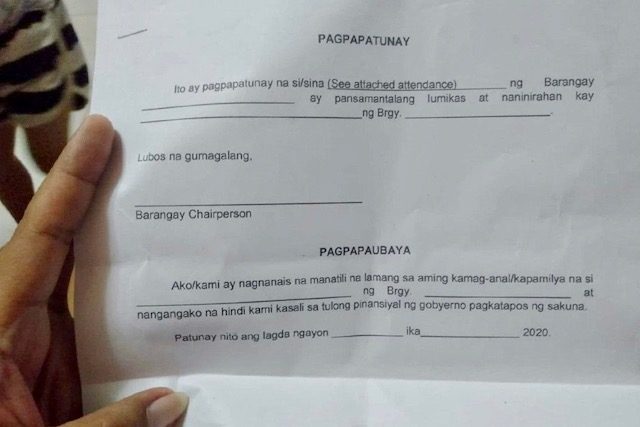SUMMARY
This is AI generated summarization, which may have errors. For context, always refer to the full article.

BATANGAS, Philippines – Tanauan City in Batangas temporarily refused to give aid to evacuees who had found refuge in their relatives’ homes instead of the government-run evacuation centers, Rappler learned on Friday, January 17.
We the verified the Facebook post of a certain Mary Flor Salvador, who said her cousins sought help from social welfare officers in Tanauan City, but were instead asked to sign a form that would prove their displacement and waive their claim to any assistance from the local government.
Salvador’s cousins went to the Gymnasium 2 evacuation site of Tanauan City, which had been packed with evacuees from neighboring towns that had been locked down.
Tanauan is one of the towns circling the Taal Lake, where the volcano sits.
The waiver read:
“Ako/kami ay nagnanais na manatili na lamang sa aming kamag-anak/kapamilya na si _____ ng Brgy _____ at nangangako na hindi kami kasali sa tulong pinansyal ng gobyerno pagkatapos ng sakuna.”
(I/we intend to remain with our relatives/families identified as ___ of the village of ______ and attest that we do not lay claim to financial help from the government after the calamity.)

Salvador slammed the local government, stressing that all of her cousins were evacuees, whether they found shelter with relatives or not.
“Sila po ay [kasama sa] forced evacuation. Gustuhin man po nilang tumigil sa mga evacuation center ay hindi po maaari dahil kakalabas lang po ng pinsan ko ng hospital,” she said. (They were forced to evacuate. Even if they wanted to stay at an evacuation center, they could not, because one of my cousins had just been released from the hospital.)
A social welfare official in the same gymnasium where Salvador’s cousins were turned away confirmed the use of the form and waiver to Rappler.
Requesting to remain anonymous for security reasons, the officer admitted that they distributed the forms, but did so only temporarily – on Thursday, January 16 . Those forms were phased out the following morning, January 17.
“Hindi pa kasi sapat ang aming mga supply (Our supplies were not enough),” the social welfare officer said, referring to staples like rice and canned goods that did not immediately arrive in their evacuation camp site.
The local government’s argument: that evacuees who stayed with relatives, who were relatively unaffected by the Taal Volcano’s unrest, needed less help. (WATCH: Taal Volcano evacuees arrive in Dasmariñas, Cavite)
Aid finally poured into evacuation centers on Friday, so the mayor, Angeline Halili, reportedly ordered local government workers to stop distributing the waiver forms.
The social worker officers began distributing bags of relief goods, and said displaced residents who were staying with their relatives could now come to the officers to claim their bags once a day.
The local social welfare officer said they were also “forced” to implement the waiver as they could not immediately verify whether the people approaching them were really displaced people. Local government workers had experience with people coming to them for help only for them to find out those were not victims needing aid. – Rappler.com
Add a comment
How does this make you feel?
There are no comments yet. Add your comment to start the conversation.